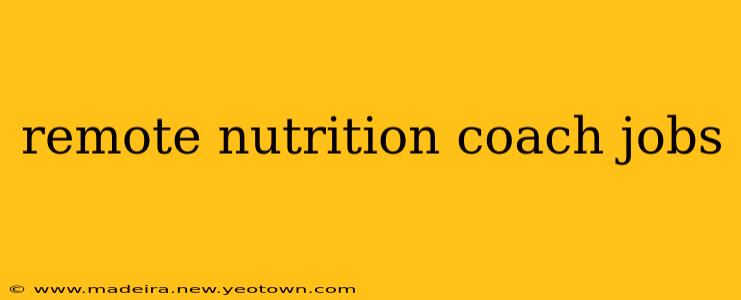The aroma of freshly brewed coffee fills the air as you settle into your home office, ready to tackle your day. But instead of the usual corporate grind, you're connecting with clients across the globe, guiding them towards healthier lifestyles. This isn't a dream—it's the reality of a thriving remote nutrition coach. The demand for online health and wellness services has exploded, making remote nutrition coach jobs a highly sought-after career path. This article will explore everything you need to know about entering this exciting field, addressing common questions and providing valuable insights to help you succeed.
What are the requirements to become a remote nutrition coach?
Becoming a successful remote nutrition coach requires a blend of education, experience, and entrepreneurial spirit. First and foremost, a strong educational foundation is crucial. While the specific requirements vary by location, most jurisdictions require at least a bachelor's degree in nutrition, dietetics, or a related field. Many successful coaches hold certifications like Registered Dietitian (RD) or Registered Dietitian Nutritionist (RDN) to enhance credibility and broaden job opportunities. However, even with certifications, practical experience is invaluable. Internships, volunteer work, or even building a small clientele before going fully remote can give you a significant edge. Finally, the ability to market yourself effectively and manage your own business is essential. You'll need strong communication skills, tech-savviness, and the ability to build and maintain client relationships remotely.
What kind of education or certification do I need to become a remote nutrition coach?
The educational path to becoming a remote nutrition coach often begins with a bachelor's degree in nutrition, dietetics, or a related field. This provides you with the foundational knowledge of nutrition science, food chemistry, and human physiology. Following this, many aspiring coaches pursue additional certifications to enhance their professional standing. The Registered Dietitian (RD) or Registered Dietitian Nutritionist (RDN) credentials are highly respected and often required for certain roles or to work with specific populations. Other certifications, such as those focused on specific areas like sports nutrition, weight management, or plant-based diets, can also help you specialize and attract a niche clientele. Remember to always check your local regulations regarding licensing and certifications.
What are the pros and cons of being a remote nutrition coach?
The flexibility and autonomy offered by remote nutrition coaching are undeniably attractive. Imagine setting your own hours, working from anywhere with a reliable internet connection, and enjoying a better work-life balance. This freedom is a major pro. You can tailor your schedule to fit your lifestyle, allowing for personal appointments, family commitments, or even travel. Moreover, the potential to reach a global clientele significantly expands your earning potential. You’re not limited geographically. However, there are also cons to consider. The remote nature of the job necessitates excellent self-discipline and time management skills. You're responsible for your own marketing, client acquisition, and administrative tasks. Loneliness and isolation can be a challenge, requiring intentional effort to build a supportive network. Finally, you are responsible for all your expenses, including software, equipment, and marketing costs.
How much can I make as a remote nutrition coach?
The income potential for remote nutrition coaches is quite variable, depending on several factors, including experience, qualifications, pricing strategy, and client base. Early in your career, you might start with lower rates, gradually increasing them as you gain expertise and build your reputation. Experienced coaches with a strong online presence can command significantly higher fees. Many successful coaches offer various pricing packages, including one-time consultations, ongoing coaching programs, and group sessions. While there's no single answer to the "how much?" question, successful remote coaches can earn a very comfortable income from the convenience of their home office.
How do I find remote nutrition coach jobs?
Finding remote nutrition coach jobs involves a multi-pronged approach. Start by networking within your field, attending online conferences, and joining relevant professional organizations. Online job boards specializing in remote work are valuable resources. Don’t underestimate the power of building your own website and social media presence. A strong online profile showcasing your expertise and testimonials builds trust and attracts potential clients. Finally, consider offering your services on freelance platforms or partnering with wellness businesses seeking nutrition coaches. Building a strong online brand is crucial for attracting clients and establishing yourself as a leading authority in the field.
Conclusion: Embrace the Flexibility and Freedom of Remote Nutrition Coaching
The world of remote nutrition coaching offers a unique blend of professional fulfillment and lifestyle flexibility. While it demands dedication, self-discipline, and strategic marketing, the rewards—both personal and professional—can be substantial. By combining solid education, practical experience, and a proactive approach to building your online presence, you can embark on a rewarding career helping people achieve their health goals, all from the comfort of your own home. So, brew that coffee, embrace the digital landscape, and start your journey toward a fulfilling career as a remote nutrition coach!

